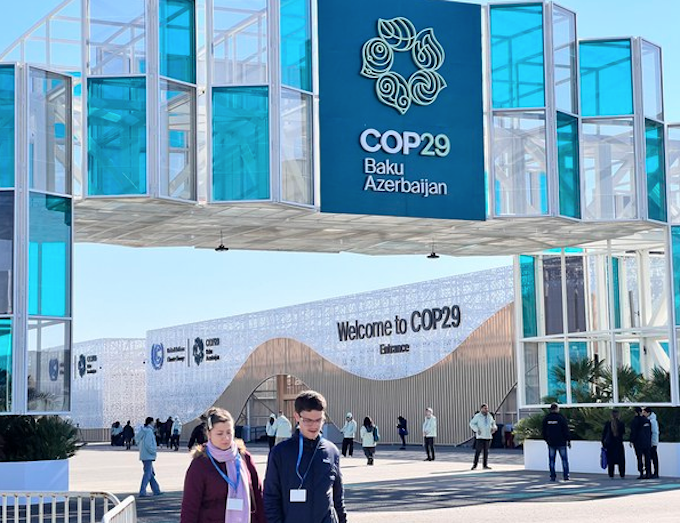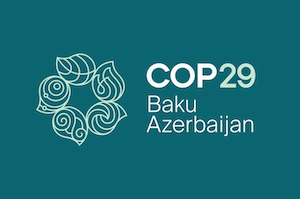
By Sera Sefeti of BenarNews
Pacific delegates fear the implications of a Trump presidency and breach of the 1.5 degree Celsius warming target will overshadow negotiations on climate finance at the UN’s annual COP talks that have started in Azerbaijan this week.
At the COP29 summit — dubbed the “finance COP” — Pacific nations will seek not just more monetary commitment from high-emitting nations but also for the funds to be paid and distributed to those countries facing the worst climate impacts.
With the US as one of the world’s largest emitters, it is feared Trump’s past withdrawal from the Paris Agreement could foreshadow diminished American involvement in climate commitments.
- READ MORE: COP29: Pacific countries cannot be conveniently pigeonholed
- COP29 Azerbaijan: What’s at stake at the 2024 global climate summit?
- Other COP29 climate reports

“We have our work cut-out for us. We are wary that we have the Trump administration coming through and may not be favourable to some of the climate funding that America has proposed,” Samoan academic and COP veteran Salā George Carter told BenarNews.
“We will continue to look for other ways to work with the US, if not with the government then maybe with businesses.”

This year, for the first time, a COP President’s Scientific Council has been formed to be actively involved in the negotiations. Carter is the sole Pacific representative.
Past COP funding promises of US$100 billion annually from developed countries to support vulnerable nations “has never been achieved in any of the years,” he said.
Disproportionate Pacific burden
Pacific nations contribute minimally to global emissions but often bear a disproportionate burden of climate change impacts.
Pacific Island Climate Action Network regional director Rufino Varea argues wealthier nations have a responsibility to support adaptation efforts in these vulnerable regions.
“The Pacific advocates for increased climate finance from wealthier nations, utilizing innovative mechanisms like fossil fuel levies to support adaptation, loss and damage, and a just transition for vulnerable communities,” Varea told BenarNews.
COP29 is being held in the capital of Azerbaijan, the port city of Baku on the oil and gas rich Caspian Sea, once an important waypoint on the ancient Silk Road connecting China to Europe.
The country bordering Russia, Iran, Georgia and Armenia is now one of the world’s most fossil fuel export dependent economies.
About 40,000 delegates will attend COP29 from all the U.N. member states including political leaders, diplomats, scientists, officials, civil society organizations, journalists, activists, Indigenous groups and many more.
All nations are party to the 1992 United Nations Framework Convention on Climate Change (UNFCCC) and most signed up to the 2015 Paris Climate Agreement and the 1.5 degree target.
Priorities for Pacific
Pacific Islands Forum Secretary General Baron Waqa in a statement yesterday said “the priorities of the Pacific Islands countries, include keeping the 1.5 degree goal alive.”
“The outcomes of COP 29 must deliver on what is non-negotiable – our survival,” he said.

Ahead of COP29, the 39 members of the Alliance of Small Island States (AOSIS) — representing the Pacific, Caribbean, African, Indian, and South China Sea — met in Baku to discuss negotiation priorities to achieve the 1.5 degree target and make meaningful progress on climate finance.
Pacific negotiators have historically found COP outcomes disappointing, yet they continue to advocate for greater accountability from major polluters.
“There have been people who have come to COP and refuse to attend anymore,” Carter said. “They believe it is a waste of time coming here because of very little delivery at the end of each COP.”
Papua New Guinea is not attending in Baku in an official capacity this year, citing lack of progress, but some key PNG diplomats are present to support the Pacific’s goals.
Climate data last week from the Europe Union’s Copernicus Climate Change Service predicted 2024 will be the hottest year on record, and likely the first year to exceed the 1.5 degree threshold set in Paris.
Science becoming marginalised
Delegates worry science is becoming marginalised in climate negotiations, with some “arguing that we have reached 1.5, why do we continue to push for 1.5?,” Carter said.
“Although we have reached 1.5 degrees, we should not remove it. In fact, we should keep it as a long-time goal,” he said.
Carter argues for the importance of incorporating both scientific evidence and “our lived experience of climate change” in policy discussions.
The fight for the Paris target and loss and damage funding has been central to Pacific advocacy at previous COPs, despite persistent resistance from some countries.
The 1.5-degree target is “a lifeline of survival for communities and people in our region and in most island nations,” Varea said.
He stressed the need for “a progressive climate finance goal based on the needs and priorities of developing countries, small island developing states (SIDS), and least developed countries (LDC) to enable all countries to retain the 1.5 ambition and implement measures for resilience and loss and damage (finance).”
“As Pacific civil society, we obviously want the most ambitious outcomes to protect people and the planet.”
Pacific negotiators include prominent leaders, such as President Hilde Heine of the Marshall Islands, Vanuatu’s Special Envoy Ralph Regenvanu, Tuvalu’s Climate Change Minister Maina Talia and negotiators Anne Rasmussen from Samoa and Fiji’s Ambassador Amena Yauvoli.
Republished from BenarNews with permission.










































